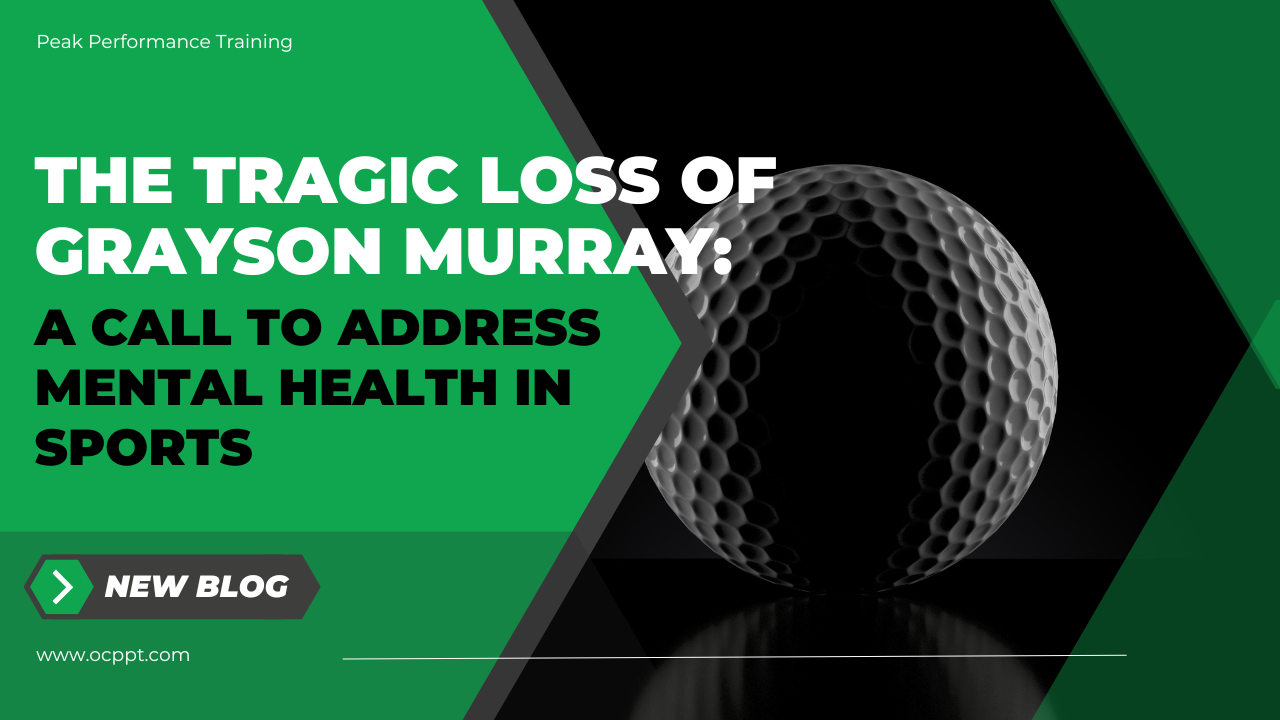
The Tragic Loss of Grayson Murray: A Call to Address Mental Health in Sports
May 29, 2024The sports world was recently shaken by the tragic news of professional golfer Grayson Murray's death by suicide. Despite his successful career and seemingly having it all, Grayson struggled with mental health, leading to this heartbreaking outcome. His story underscores a critical issue: young athletes often lack coping strategies to handle the increasing pressure and stress as they advance in their sports careers.
Key Highlights from Grayson Murray's Career
Career Achievements:
- Two-time PGA Tour winner.
- Won the prestigious Junior World Championship in San Diego three times consecutively.
- Earned the Arnold Palmer Scholarship at Wake Forest.
- Won the Sony Open in January and the Barbasol Championship as a 22-year-old rookie.
- Ranked No. 58 in the world, with notable performances in major tournaments like the Masters and the PGA Championship.
Challenges and Triumphs:
- Struggled with alcohol early in his career but made a significant turnaround by achieving sobriety eight months before his death.
- Open about his mental health battles and the pressures of professional sports.
Personal Life:
- Engaged to be married and believed his best golf was still ahead.
- Appointed to the PGA Tour's 16-member player advisory council.
Here’s an athlete who was clearly very successful and had a bright future in front of him both professionally and personally. He had struggled in the past but had turned a corner and seemed to be doing extremely well. THIS is why mental health and working on mindset is a MUST. Despite his accomplishments, Grayson's internal battles were not evident to many around him. His family, friends, and teammates are now left grappling with the profound loss, highlighting the invisible struggles athletes often face.
The Broader Issue:
Grayson Murray's story is not an isolated case. Many athletes who appear successful on the surface suffer in silence. The pressure to perform, the fear of losing playing time, and the stigma around mental health create a toxic environment where athletes feel they must hide their struggles. This environment can lead to devastating outcomes, as seen with the increasing suicide rates among collegiate athletes.
Young athletes without coping strategies to handle pressure and stress become adult athletes without the coping strategies to handle pressure and stress. As they progress in their sport, that pressure and stress get heavier and heavier, and the stories they are telling themselves in their minds get scarier and seemingly harder to find a way out of.
It doesn’t go away just because they get a college scholarship or make it to the professional level… If anything, it gets harder.
Statistics:
- Suicide rates among collegiate athletes have doubled, making it the second leading cause of death.
- The youth sports culture pushes scholarships as the ultimate goal, causing immense pressure.
- 91% of high school athletes experience depression, and 35% face debilitating mental health crises, with less than 2% receiving scholarships.
Call to Action:
Changing the youth sports culture is imperative (and I’m on a mission to do so!), but in the meantime, there are immediate steps that can be taken to support our athletes, now:
- Open Communication: Encourage open and honest conversations about mental health without fear of judgment or repercussions.
- Mental Health Resources: Provide access to mental health professionals and resources tailored for athletes.
- Stress Management Training: Implement training programs focused on stress management and coping strategies.
And a few extra – real talk here:
- Stop pushing your own personal agenda: This is your CHILD we are talking about. If you are criticizing, judging, pressuring, or forcing them, you are contributing to the problem. Stop. Your focus for them should be fun. Sports are meant to be fun! Doing any of those things will burn them out and destroy your relationship.
- Stop signing them up for ALL the things (off-season tournaments, a million private lessons, and off-season seasons): They need breaks. They should not be playing one sport year-round. They need to play other sports to develop as an athlete and to avoid injury and burnout. They need time to decompress and spend time with their friends, being a kid. They are not going to “fall behind,” and if the coach says they will be cut if they don’t follow suit, they do not have your child’s best interest in mind – period!
Grayson Murray's tragic death is a stark reminder that success in sports does not equate to mental well-being. By addressing these issues head-on and supporting athletes holistically, we can prevent such tragedies in the future.
Let’s work together to create a supportive environment for our athletes, ensuring their mental health is prioritized just as much as their physical performance.
Questions? Reach out any time: info@ocppt.com
